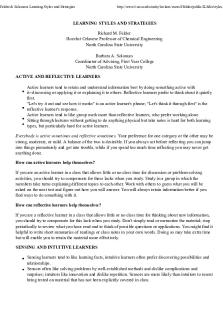Soloman Asch experiment PDF

| Title | Soloman Asch experiment |
|---|---|
| Course | Introduction To Sociology Contemporary Society |
| Institution | LaGuardia Community College |
| Pages | 3 |
| File Size | 85 KB |
| File Type | |
| Total Downloads | 96 |
| Total Views | 122 |
Summary
essay...
Description
Introduction to Sociology - SSS 100 22 October 2021 Essay Question: Summarize the Solomon Asch experiments. What did the experiments reveal about group conformity? Is it possible for an individual to break free of group influence? Why or why not? Asch’s Experiment and Conformity Growing up as a kid, my mom used to ask me this question every time I found myself in a problematic situation because of the influence of my friends "if your friends jump off a bridge, would you do it too?". As crazy as this sounds, this question intends to help kids realize the power of peer pressure. Surprisingly, there is a fair chance some people would jump off a bridge after all for their friends. Conformity forces people to abandon all reason and reality altogether. Why else would people commit horrific violent acts like those during World War 11 and the holocaust? Conformity is the adaptation of one's behavior or thinking to match the standards and beliefs of a group (Chartrand & Bargh, 1999). Solomon Asch demonstrated the negative effects of conformity in our society during the late 1940s by experimenting with a group of people. For a vision test, Asch brings individuals into a room full of confederates or actors. The trick was that the confederates were prepared to give the wrong answer while the participant was merely the test subject. The tests of vision were to look at two images. One image has one individual line, and the other has three other lines labeled A, B, and C. One of these marked lines was the same length as the individual line, while the others were noticeably longer or shorter. Asch asks a series of questions about which labeled line was the same length as the individual line. During this experiment, without any influence from anyone else, the participants answered correctly.
They match the right lines. He later experimented with showing that they are less likely to conform when people make and share information privately. Asch instructed the confederates or actors to choose the wrong answer confidently; then, the participant would have to decide. He wanted to know if they would go with their gut and answer correctly separate from the group or conform to their peer pressure and choose the incorrect answer. Though the answer is nondebatable and straightforward, Asch found out that one-third of the participants answered incorrectly to conform with the group. According to Asch, after he finished experimenting, he interviewed the participants, and most of them that conformed with the group confessed that they went along with the group answer even though they did not believe it was correct because they feared being ridiculed or thought peculiar. On the other hand, a few of those participants said they believed the group answers were correct. As a result of that information, some participants conform to the group because they want to fit in, while others believe they possess less knowledge or are less informed than the group. While humans are very susceptible to conformity, an individual can break free of social influence. Individuals who copy others without second-guessing are less knowledgeable and are ready to go with the social default flow. As one grows in knowledge and develops the ability to stand out and do things differently, not allowing others to dictate what they should think, feel, or do, freedom will emerge. Using my own experiences as an example, I have experienced conformity in my earlier life. Fortunately, I have managed to break free of such influence by developing know-how, insight, forming my own opinions, making my own choices, and showing courage in rejecting peer pressure and other forms of influence.
In conclusion, humanity is inclined to conformity, and based on my experience, I believe that one can break free of group influence by improving their personal qualities. Works Cite: Conley, Dalton. You May Ask Yourself: An Introduction to Thinking like a Sociologist. 6th ed., WW Norton, 2019. https://www.simplypsychology.org/asch-conformity.html...
Similar Free PDFs

Soloman Asch experiment
- 3 Pages

Asch 1946 - 2017
- 33 Pages

Experiment-2 Experiment Notes
- 4 Pages

Experiment 8
- 20 Pages

Experiment CV
- 1 Pages

Jekyll Experiment
- 1 Pages

Aspirin Experiment
- 7 Pages

Experiment II
- 6 Pages

Helicopter Experiment
- 3 Pages

Silvertooth Experiment
- 5 Pages

Experiment 11
- 10 Pages

Experiment 6
- 8 Pages
Popular Institutions
- Tinajero National High School - Annex
- Politeknik Caltex Riau
- Yokohama City University
- SGT University
- University of Al-Qadisiyah
- Divine Word College of Vigan
- Techniek College Rotterdam
- Universidade de Santiago
- Universiti Teknologi MARA Cawangan Johor Kampus Pasir Gudang
- Poltekkes Kemenkes Yogyakarta
- Baguio City National High School
- Colegio san marcos
- preparatoria uno
- Centro de Bachillerato Tecnológico Industrial y de Servicios No. 107
- Dalian Maritime University
- Quang Trung Secondary School
- Colegio Tecnológico en Informática
- Corporación Regional de Educación Superior
- Grupo CEDVA
- Dar Al Uloom University
- Centro de Estudios Preuniversitarios de la Universidad Nacional de Ingeniería
- 上智大学
- Aakash International School, Nuna Majara
- San Felipe Neri Catholic School
- Kang Chiao International School - New Taipei City
- Misamis Occidental National High School
- Institución Educativa Escuela Normal Juan Ladrilleros
- Kolehiyo ng Pantukan
- Batanes State College
- Instituto Continental
- Sekolah Menengah Kejuruan Kesehatan Kaltara (Tarakan)
- Colegio de La Inmaculada Concepcion - Cebu



